The change comes at a time when the United States is fighting its own shortages.
President Joe Biden plans to announce on Friday that the United States will contribute $ 2 billion to a UN-backed program that seeks to distribute doses of the COVID-19 vaccine to people in the world’s poorest countries, according to senior officials at the United Nations. Biden government.
Congress had already allocated the money in December for the United States Agency for International Development to provide Gavi with an international vaccine distribution alliance. Congress provided a total of $ 4 billion and officials said the United States would hand over the rest to Gavi throughout this year and 2022.
The move, which the White House said Biden plans to announce during a virtual meeting of the Group of Seven leaders, comes at a time when the United States is struggling not to have enough doses to vaccinate its own population, despite the situation in the poorest countries. poor is much worse.
To date, 10 countries have administered 75% of all COVID-19 vaccines, while more than 130 countries have yet to receive a single dose, the United Nations said on Wednesday.
Many countries are unable to compete with wealthier countries, such as the United States, to buy the limited quantities of vaccine doses available from manufacturers. In conjunction with the World Health Organization and the Coalition for Epidemic Preparedness Innovations foundation, Gavi runs a worldwide vaccination initiative called COVAX, which aims to address this disparity by distributing doses more equitably.
Although then President Donald Trump signed a December bill that earmarked $ 4 billion for Gavi, he had refused to support COVAX and his government also decided to sever ties with the World Health Organization.
Biden has dramatically reversed this approach, keeping the United States in WHO and making fighting the pandemic COVID-19 worldwide a national security priority.
But ending the global outbreak has proved complicated with the limited availability of vaccine doses.
The United States has so far purchased 600 million doses of vaccines, but does not intend to give any of them to other countries until – as Biden instructed in a January 21 memorandum – “there is sufficient supply in the United States”.
A senior government official said on Thursday that “this promise to COVAX has no impact on the United States’ vaccination program.”
“Although we cannot share vaccine doses at this time, while we are focused on American vaccinations and getting injections in the arms,” said the official, “we are working hard to support COVAX, strengthen global vaccination worldwide and determine the deadline for when we will have a sufficient supply in the United States and be able to donate surplus vaccines. “
Meanwhile, China and Russia have donated doses of their locally grown COVID-19 vaccines to partners and developing countries as a form of “vaccine diplomacy”. The United States has not yet followed suit.
Government officials argued that vaccinating people abroad protected the health of Americans at home.
“Decreasing the burden of disease decreases the risk for everyone in the world, including Americans,” said the official. “It also decreases the risk of variants occurring, like the ones we are seeing now. Therefore, it is extremely important to increase vaccination globally, while we are, of course, prioritizing vaccinations here at home.”
The official said the first installment of $ 2 billion would be donated “within a few days or weeks” and “ideally by the end of this month”. Of the additional $ 2 billion, the United States plans to contribute the first $ 500 million “fairly quickly” to “encourage some of these initial doses to be available”, but intends, at least initially, to contain the rest to encourage other countries to make your own promises, the official said.
“This pandemic is not going to end unless we end it globally,” added the official.
ABC News’s Conor Finnegan contributed reporting.
